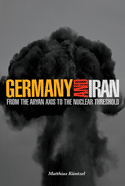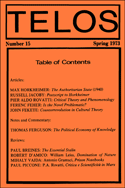As far as the willingness to accept refugees is concerned, Germany is the lonely leader in Europe. No other European country is behaving similarly, nor does the United States. Evidently there is a new special path for Germany. How can this be explained? First of all: Germany is prosperous; we’re doing quite well. If we had southern European unemployment rates or the scarcity of East European countries, we would be less hospitable. Furthermore, influential industrial associations early on argued for the generous reception of refugees and continued to oppose the reestablishment of national border controls, on the basis of economic interests. Human rights activists and capitalists are promoting the same policy, and not for the first time. The left-wing critique of capitalism generally overlooked this affinity, but right-wing capitalism critics understand this very well: for them capitalism is not sufficiently national—it is too universalist.
|
In this video from the 2014 Telos in Europe Conference, Benjamin Martin talks about his research on the idea of European culture, arguing that its emergence among intellectuals after World War I and its subsequent embrace by the Nazis and Italian Fascists serves as a cautionary historical lesson. Telos Press Publishing is pleased to announce that Matthias Küntzel’s Germany and Iran: From the Aryan Axis to the Nuclear Threshold is now available for pre-order. The book will be released on November 1, 2014. Pre-order your copy today, and we will ship it as soon as it is in stock. An article by Hamid Dabashi recently appeared in the online version of the English-language edition of Al Jazeera. Dabashi teaches Iranian Studies and Comparative Literature at Columbia University, where the exiled Frankfurt School thinkers Max Horkheimer and Theodor Adorno found refuge during the period of National Socialism. Dabashi quotes Adorno’s 1949 thesis that it is barbaric to write poetry after Auschwitz and asks what it really means: “How could writing poetry after a calamity such as Auschwitz, and by extension a horror like the Holocaust, be something barbaric? Doesn’t poetry console in moments of mourning and despair?” |
||||
|
Telos Press Publishing · PO Box 811 · Candor, NY 13743 · Phone: 212-228-6479 Privacy Policy · Data Protection Copyright © 2024 Telos Press Publishing · All Rights Reserved |
||||

 In November 1939, gangs of German civilians and Nazi operatives stormed Jewish stores, synagogues, and homes, killing or arresting those who could not escape. The Nazi leadership had carefully planned the assault—Kristallnacht would become only one among many instances of unimaginable horror. In the coming years, the Nazis proceeded to murder thousands of disabled Germans; when Germany invaded Russia, groups of special units—known as Einsatzgruppen—followed closely behind the German army, liquidating Jews, Communists, and Roma.[1] By 1942, the Nazi death camps had initiated yet another gruesome and terrifying phase of the Reich’s program of anti-Semitism and racial purity.[2]
In November 1939, gangs of German civilians and Nazi operatives stormed Jewish stores, synagogues, and homes, killing or arresting those who could not escape. The Nazi leadership had carefully planned the assault—Kristallnacht would become only one among many instances of unimaginable horror. In the coming years, the Nazis proceeded to murder thousands of disabled Germans; when Germany invaded Russia, groups of special units—known as Einsatzgruppen—followed closely behind the German army, liquidating Jews, Communists, and Roma.[1] By 1942, the Nazi death camps had initiated yet another gruesome and terrifying phase of the Reich’s program of anti-Semitism and racial purity.[2] 






